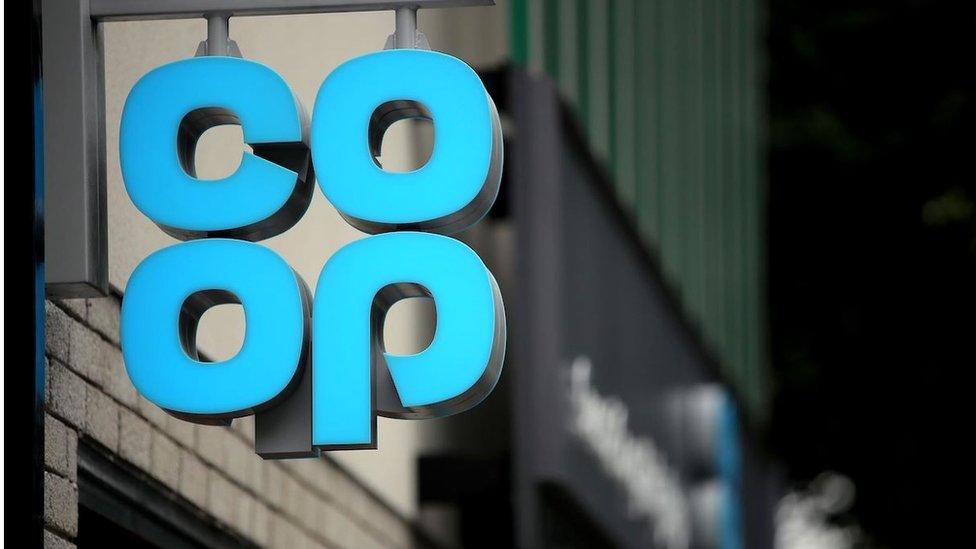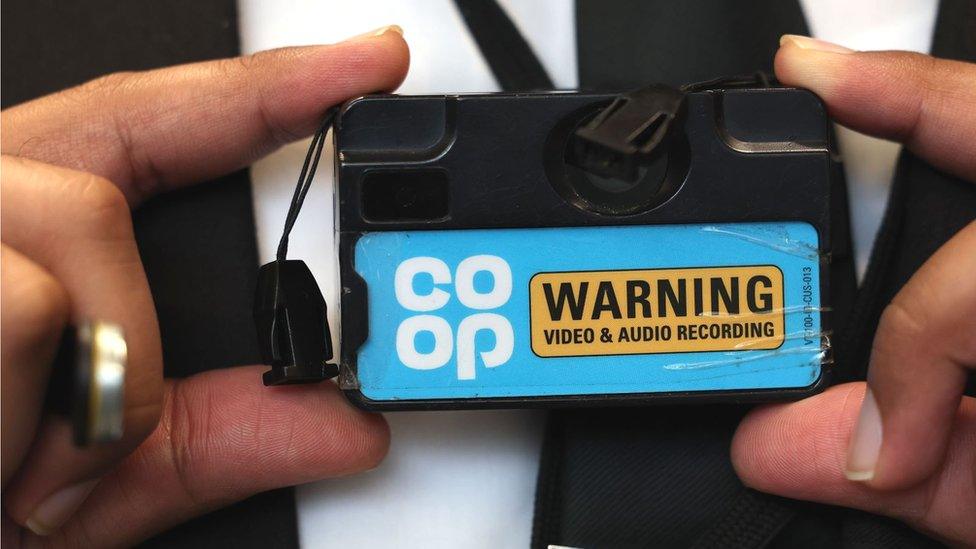Co-op boss warns of shoplifting 'anarchy'
- Published
CCTV footage from Co-op stores in Scotland show shoplifters filling large bags with items from the shelves.
A Co-op boss has warned that stores are descending into "anarchy" as staff face a sharp rise in retail crime.
Operations director Kate Graham said the company was facing prolific shoplifting to order and a rise in armed robberies.
UK stores have seen a 35% increase in crime in the past year and more than 900 staff were physically assaulted.
The Scottish Grocers' Federation said a survey had found all of its members now experienced theft on a daily basis.
Earlier this week, the latest Scottish crime statistics, external revealed that shoplifting increased by 21% over the past year, although the figure is still lower than in 2019 before the Covid pandemic.
Ms Graham, who is responsible for all of the company's stores including 340 in Scotland, said the problem had "gone beyond" anything she had known in her 25-year career.
She told BBC Radio Scotland's Drivetime programme that crime was also rising in areas which had never had issues before.
"It is now quite standard to have product protection on lots of key lines that are seen as high theft lines," she said.
"We look at things that are potentially used to sell on. You have got your standard things like steak.
"However, we are seeing things like baby milk being stolen because it is being used to cut drugs.
"We are seeing things in health and beauty being stolen as it is being used to fund organised crime.
"Coffee, confectionery, we are seeing kiosk breaches, armed robbery, wines and spirits - there are not many items that are not being targeted."

The Co-op's Kate Graham is responsible for all 340 of Scotland's stores
Ms Graham said that staff were often aware of who was carrying out the thefts.
"What we are seeing is blatant looting - people just coming in with a large bag and taking what they want because they are recognising the lack of consequence. We are seeing repeat offenders and we are seeing prolific shoplifting. People are stealing to order so this is absolutely not about the cost of living crisis."
She described individuals entering stores in some parts of the UK and "sweeping an entire shelf" into a bag.
"There was an armed robbery in Glenrothes recently - it was actually a gun crime. There have been a number of armed robberies in the Edinburgh area and the Glasgow area. That is an increase on anything I have seen before."
The Co-op has spent millions on the design of its stores to try to prevent theft, she said. Steak and cheese are being fitted with security tags and coffee is being replaced with dummy jars in stores.
Staff go through conflict training but are encouraged not to put themselves at risk - which, she says, is sometimes exploited by thieves.

A recent Freedom of Information request revealed that 71% of reported incidents were not attended by police officers.
"With no consequences, it creates anarchy," she said.
The Co-op - and other retailers - want the police to take action and for the courts to then give out sanctions which will serve as a deterrent.
The Scottish Grocers' Federation (SGF) which represents convenience stores including Spar, Londis and Scotmid said its members had also noticed a rise in shoplifting.
Its chief executive, Dr Pete Cheema OBE said: "Reports of increased shoplifting are coming in from a number of sources alongside a rise in anti-social behaviour toward staff within stores.
"It is not only staff wellbeing and businesses that are being impacted by these crimes, but families and the wider community as well.
"SGF's annual Scottish Retail Crime Report highlights that 100% of respondents experience shop theft at least once a day and all experience abuse, violence or hate crime on a regular basis."
Maxine Fraser, of Retailers Against Crime, told BBC Scotland's The Nine programme that last year its members reported £1m in losses but had already surpassed that this year.
She said the group was aware of 40 organised crime groups operating across Scotland with 40,000 individual offenders in their system.
She added that staff were scared to go into work and there were no consequences for shoplifters.
Dame Sharon White, the boss of John Lewis, told the BBC last week that shoplifting had become an "epidemic" in the past year.
She said the retailer had seen offences double over the past 12 months.

Co-op staff have been issued with body cameras to capture incidents
David Kennedy from the Scottish Police Federation told Drivetime: "Calls are being stacked within control centres because there is no one to attend.
"We have been saying for a long time that the service just does not have enough police officers to do the job they need to do. And the recent announcement that the numbers will be reduced by another 600 because of the budget proposed just sets alarm bells ringing.
"The calls are not being answered because there is nobody to go. The call might be sent across to the division for them to send somebody, but if no one is going at the point when they are needed, by the time somebody is ready to attend, it's too late."
He added: "There's not enough people taking the calls and not enough police officers to respond to the calls."
Det Supt Andrew Patrick from Police Scotland, said: "We work closely with partners in the retail and business sectors to deter, prevent and investigate shoplifting.
"Where we identify business which are being targeted by shoplifters, we have trained officers who can attend and carry out security surveys and offer advice around prevention.
"I would encourage businesses to invest in crime reduction measures and education to help reduce shoplifting."